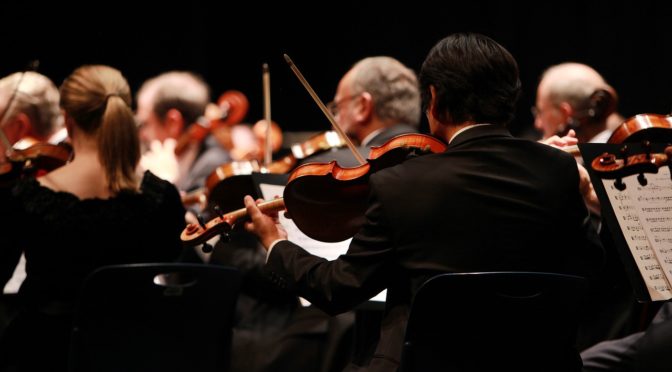

 by Bernard LeBlanc, AFM Symphonic Services Division (SSD) Canada Director and Associate Directors Christine Little Ardagh and Steve Mosher
by Bernard LeBlanc, AFM Symphonic Services Division (SSD) Canada Director and Associate Directors Christine Little Ardagh and Steve Mosher
Note: This article addresses the topic of organizing within Canada and under Canadian provincial labour law. Some of the techniques described in this article would not be advisable when organizing an orchestra in the US under US labor law. For assistance in organizing a US symphony orchestra, please contact SSD.
Anyone who has served on an orchestra or negotiations committee knows how much work is done behind the scenes to keep things running smoothly on stage. Regularly negotiated agreements deal with the endless details inherent in organizing large-scale performances and reflect the commitment of committee members and local officers to improve and update working conditions for the musicians in their organizations.
But what if you play in an orchestra where there is no agreement in place and you think that your orchestra would benefit from a different kind of relationship with your management? This year the Canadian Federation of Musicians (CFM) Symphonic Services Division has been working closely with several orchestras, including those in Kingston, Gatineau, and St. John’s, seeking a first agreement between the CFM or the AFM local and the symphony societies. There is no one-size-fits-all template and outcomes are always contingent on the enthusiasm, competence, and commitment of a variety of people (on both sides of the table) to shepherd an idea through to completion. There are, however, standard questions and steps that can apply to most situations.
What are the first questions to ask?
Is there a set of guidelines that currently govern how the orchestra operates? Does it outline fees, working conditions, dispute resolution, guaranteed number of services to a core group, etc.? And when was it last updated?
Is there an elected orchestra committee? The orchestra committee must talk to the orchestra to find out the appetite for a negotiated agreement by asking them to vote on whether to pursue an agreement or not. The musicians should be informed that they will all be required to join the local and keep their membership up-to-date.
Do you already have a member of the orchestra invited to board meetings? Find out if the management and board are open to the idea of entering into a more formal agreement. If they are, inform both management and the board of what has been going on and get a feel of whether or not they will meet with the local to discuss first steps.
What preparation needs to be done?
Create a negotiations committee. This is separate from the orchestra committee, but should have some crossover. It should be drawn from a cross-section of the orchestra and, if possible, include section strings, winds, and brass, and principal players. The negotiations committee may be elected. The orchestra committee can post a sign-up sheet, and in that way, invite broader representation.
Create and adopt orchestra bylaws. The orchestra will benefit in the long run from having a constitution and bylaws that govern day-to-day operations of the players’ association. The bylaws should also refer to contract negotiations and the method for striking a negotiations committee. The negotiations committee should then set their own guidelines for the current round of negotiations. Make sure that your local officer has a copy of the bylaws. The local is the signatory to your agreement. If they don’t know what is in your bylaws, it will affect their ability to deal with any problems or issues that come up during or between negotiations.
Survey orchestra members. Find out what orchestra members want in an agreement and identify areas where there have been problems in the past.
List current orchestra members: The orchestra committee and local should work together on creating a complete list. Include anyone who has played a concert with the orchestra in the past three years.
What are some general suggestions for contract negotiations?
Symphonic Services has pamphlets that outline the procedure and include model language for contract negotiations. The negotiations committee must present reasonable proposals to management that the entire committee agrees on, which means that a great deal of discussion must happen in caucus prior to meeting with management. Personal agendas may be aired and given consideration, but it is always the primary duty of the negotiations committee to represent the orchestra fairly.
Templates are available from the Symphonic Services Division for the following:
• Orchestra committee bylaws
• Negotiations committee guidelines
• Orchestra surveys
• Robert’s Rules/Bourinot’s Rules/Code
Morin (in Québec)
Always follow the survey results. The orchestra has let you know how they feel about each of the questions or statements presented in the survey. It is important to respect and include that input. It is essential that there is transparency and consistency throughout the process, and no hint that the orchestra committee, negotiations committee, or the local is deviating from the stated goals of the committee.
What kind of agreement best suits our needs?
Unlike musicians in the US, the majority of symphony musicians in Canada are independent contractors (self-employed), although there are some orchestras where musicians are classified as employees, including dependent contractors, under the Labour Relations Act. Symphonic Services can provide documents that outline the differences between employer/employee covenants and agreements for self-employed independent contractors. There can be implications for tax status and the Canada Revenue Agency that need to be considered. SSD can provide access to an online archive related to arts organizations to help understand the relevant issues.
In most cases, the CFM or the local seeks a collective agreement with the symphony society. The principal ways to achieve that are 1) through certification under the Labour Relations Act and collective bargaining (employer/employee relationship, including dependent contractor) or, 2) through voluntary recognition of the CFM, or the local, for collective bargaining. However, the first attempt at negotiation does not always result in a collective agreement and, in some cases, it is not the desired outcome. If that’s the case, or in the event that the management does not recognize the CFM or the local as the exclusive bargaining agent, a properly crafted “master” agreement with reference to the Arbitration Act is enforceable in the event of a dispute.
Provincial Labour Laws
Check your provincial labour laws related to the bargaining process. There are timelines to follow with respect to certification and collective bargaining. There are similar timelines for Voluntary Recognition Agreements once the CFM or local is recognized as the exclusive bargaining agent for the players. In Québec, the Status of the Artist legislation automatically recognizes Local 406, La Guilde des Musiciens et musiciennes du Québec, as the bargaining agent for musicians.
Which key people should be
involved in the negotiations?
• Orchestra committee—four or five elected representatives
• Negotiations committee—may be elected, or open to anyone willing to make the commitment and to attend meetings; can be from three to 10 people
• Representative of the local—must be willing to attend all meetings
• Influential orchestra members—whether or not they agree to serve on a committee, they will be crucial in helping move the process forward
• AFM Symphonic Services Canada Director Bernard LeBlanc who can be reached at bleblanc@afm.org
This article is written for orchestras contemplating first negotiations, but many of the suggestions apply equally well to orchestras with existing agreements as they renegotiate new terms and conditions. We have focussed on the areas where we have the most control and where we can generate the potential for success, which is with the musicians themselves, committees, and local officers.
Remember that an agreement may be changed every time it is re-opened or renegotiated. Orchestra bylaws or internal policies can change at any players’ association or players’ committee meeting. Always keep your local updated on changes that are made.
The Kingston, Gatineau, and St. John’s negotiations are currently in progress. SSD Canada is always ready and available to support musicians who wish to change or more clearly define their relationship with their orchestra management.



